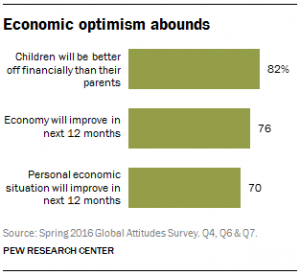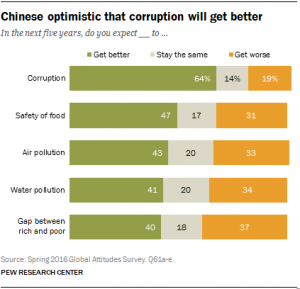Surveys Show Consistent Support for the Chinese Government
If you are an ill-informed or naïve listener to the Western media, China’s economy is in the doldrums, support for the Communist Party of China (CPC) is evaporating at an unprecedented pace, and China is on the verge of systemic collapse. However, contrary to perceptions perpetuated by Western and other press, the reality tells a whole different story.
Perennial surveys by US-based polling organizations and academic studies show strong widespread support for policies of the Chinese government and for President Xi Jinping’s tough on-going anti-corruption campaign. This week, a sweeping poll of over 3,100 Chinese respondents over the spring conducted by Washington-based Pew Research Center (PRC) found consistent public satisfaction with China’s economic performance and optimism both about people’s personal future economic fortunes and that of the country.
Due to the country’s transition to a more consumption-led economic model and lackluster global growth as a whole, China’s economy has slowed from the heydays of 10+% to the sub 7% of today. In spite of this, however, views about the economy remain widely positive. Nearly 9-in-10 respondents to the PRC survey described China’s economic situation as either “very good” (33%) or “somewhat good” (54%) with most anticipating continued progress in the coming year. More important, the public remains optimistic about China’s long-term economic prospects with 82% expecting their children to be financially better off than they currently are. This finding is buttressed by PRC’s previous global surveys pointing to Chinese positivity compared to others around the world.
Chinese survey-takers gripe about many problems; namely, air and water pollution, food and medicine safety, the yawning gap between the rich and poor, but the one that trumps all is political corruption. Over 80% thought corruption within the ranks of the CPC and in the halls of government was either a major problem or a moderately big issue. On balance, the Chinese public is nonetheless optimistic that corruption will be reined in over the next five years, especially under President Xi Jinping’s watch. A nearly 2/3 majority (64%) said corruption will decline with only 19% thinking it will do the reverse. Since entering office in 2013, Mr Xi has made anti-corruption a major hallmark of his governance, successfully bringing down some of the biggest-name ‘tigers’ as well as swatting ‘flies’ at the grassroots.
These findings are confirmed by in-depth studies made in 2010 and 2014 by George Washington University political scientist Bruce Dickson whose results were compiled into his book The Dictator’s Dilemma released over the summer. Chinese pollsters commissioned by Professor Dickson conducted face-to-face interviews with over 4,000 Chinese citizens in 50 cities across the country. The Washington Post recently interviewed Mr Dickson about his findings which he ascribed as “surprising” but actually should not be to scholars familiar with the topic.
Commenting on the discrepancy between his findings and the plethora of negative portrayals in the Western press, he said while the Chinese people have many things to complain about, just like a lot of Americans, they do not desire a change in government to deal with them. “…They say ‘Of course not’. They just want the current system to work better. The findings from my surveys are different from the messages that we often get in the media, but they are consistent with every academic study I’ve seen that has looked at regime support in the country…(W)hen you step back and look at things from a broader perspective, you find that, despite the frustration about specific policy areas, there is still strong support for the regime.”
From his findings, he took away two conclusions: First, people indicated their incomes were rising and remained optimistic about future income gains. Mr Dickson commented so long as incomes continue to rise “pocketbook” issues [one’s personal financial well-being] often outweighs “sociotropic” concerns [one’s assessment of the prospects of the broader economy]. Second, on corruption, because his surveys were conducted before President Xi first assumed office and following his hardnosed anti-corruption campaign afterwards, the results showed people witnessing corruption situation on the mend and that even very high-ranking officials could be brought down.
Interestingly, on the issue of censorship, Mr Dickson found “…only a relatively small segment said they had experienced censorship. Among the people who had experienced it said it didn’t matter, that they weren’t bothered by it. Out of the entire set of respondents, only about 7% or 8% said that they were actually angry about encountering censorship. It seems as though most people don’t encounter censorship because they’re not doing political things online. They’re not searching for political sensitive information. They are not going to foreign websites. They’re playing games. They’re checking email. They’re shopping. The ones that do encounter censorship seem to take it in stride because this has been the nature of the web in China from the very beginning.”
The PRC surveys and Professor Dickson’s studies provide ear-to-the-ground monitoring of Chinese views which are far more accurate than the overwhelmingly negative and misguided depictions of the Western press that only serve to distort China’s realities.


